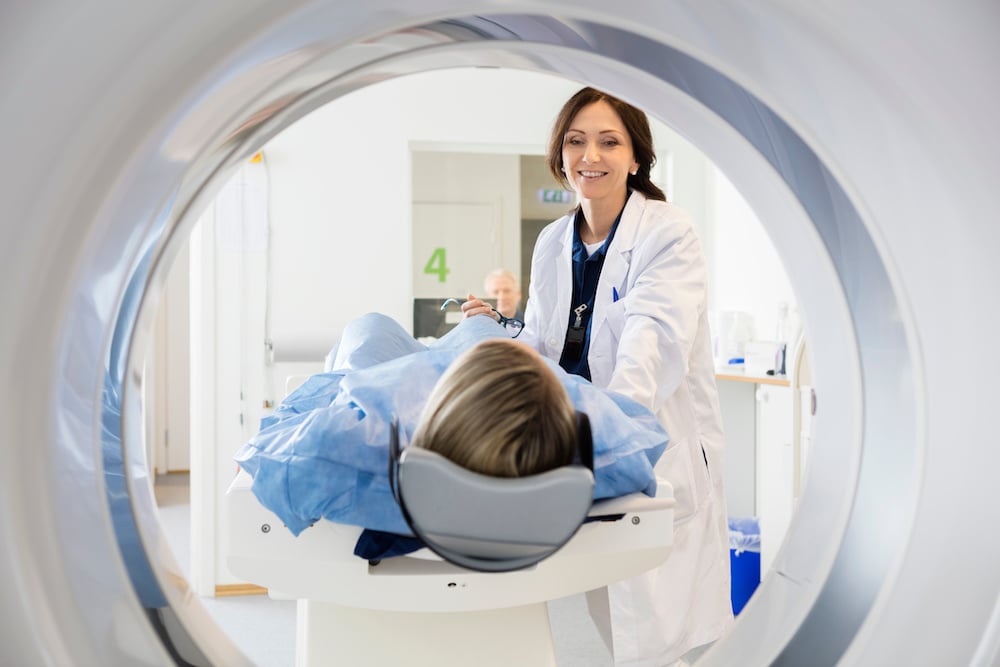How is Lung Cancer Diagnosed and Treated?
5 min read

If your doctor requested more tests after a lung cancer screening, a chest x-ray for another medical condition that showed something unusual, or you’re experiencing lung cancer symptoms, don’t wait. Having these tests completed as soon as possible is important so your doctor can rule out lung cancer or diagnose it correctly.
Diagnosing Lung Cancer
There are a few reasons your doctor may request further testing for lung cancer, including:
- You’re experiencing lung cancer symptoms. Some may be surprising! Read more in our blog: 16 Unexpected Lung Cancer Symptoms You Should Know About.
- You had a chest X-ray, often for a separate medical condition, that showed an area of concern or a “spot.”
- Your lung cancer screening results show something abnormal. Find out if you qualify for lung cancer screening.
- You were diagnosed with a lung nodule that needs further testing to see if it is cancerous. Learn more about lung nodules.
Your primary care physician or pulmonologist will oversee the tests and review the results with you. If you’ve already had a chest X-ray, the next step is most likely a CT or MRI scan, as these show a cross-section of the lung with more detail. Your physician may also request blood tests to look for signs of cancer. The doctor will ask about your medical history, discuss your symptoms and risk factors, and perform a physical exam that includes listening to your heart and lungs.
If the scans or the bloodwork show signs of cancer, a biopsy is the next step for most patients. During a biopsy, the pulmonologist will collect a small tissue sample using a needle guided by a CT scan. The sample is evaluated by a doctor, called a pathologist, who provides a report of the findings. If cancer cells are found, the report will also tell the doctor which kind of lung cancer is present.
Learn more about the tests used to detect and diagnose lung cancer.
Lung Cancer Is Confirmed: Now What?
After receiving a confirmation of lung cancer, the next step is to meet with a medical oncologist, a physician who specializes in treating cancer. The pathology report from the biopsy will provide the oncologist with important information about the type of lung cancer and its genetic makeup. Most likely, it is one of the two most common types: non-small cell lung cancer (NSCLC) or small cell lung cancer (SCLC).
Before finalizing the treatment plan, the oncologist must also determine the stage of the disease. Lymph nodes are tested to see if the cancer has spread there, and additional scans may be required, such as a PET-CT scan. This imaging test identifies other areas of the body where cancer may have spread, even if a CT or MRI scan can’t detect it yet.
Read more about the stages of non-small cell and small cell lung cancers.
What are the Treatment Options for Lung Cancer?
Each person's treatment plan for lung cancer is unique, just like they are. Fortunately, there are several lung cancer treatment options available, whether you were diagnosed with non-small cell lung cancer or small cell lung cancer.
Your lung cancer care team, led by the medical oncologist, will consider the location of the cancer, type of lung cancer, stage, biomarkers, and personal preferences to create a customized treatment plan for you. They will also consider your overall health. For example, some patients may not be healthy enough for surgery. These patients will receive a different treatment plan than those who can have surgery.
Your treatment plan will likely include several therapies, such as surgery, chemotherapy, radiation therapy, immunotherapy, targeted therapy, or a combination of these treatments.
- Surgery is considered the best method to treat early-stage non-small cell lung cancer. However, it may also be used to treat small cell lung cancer if the cancer is found in only one lung and only in nearby lymph nodes. After surgery, additional treatments such as chemotherapy or radiation therapy may be necessary for all types of lung cancer to kill any remaining cancer cells.
- Chemotherapy is often used to treat small-cell lung cancer, whether alone or with radiation therapy. While chemotherapy is not included in the treatment plan for all non-small cell lung cancer patients, it is used in various situations, such as before or after surgery, or to treat lung cancer that has spread to other parts of the body, including lymph nodes.
- Radiation therapy is used to treat both non-small cell and small cell lung cancers, either as the primary treatment or alongside surgery to increase its effectiveness. It is also used to reduce pain caused by lung cancer.
Get answers to When Is Radiation Therapy Used to Treat Lung Cancer?
- Immunotherapy drugs, called checkpoint inhibitors, can be used for patients with small cell or non-small cell lung cancer to help their immune system recognize and destroy cancer cells. In recent years, there has been rapid development of immunotherapies for lung cancer, which continue to show promising results.
- Targeted therapy is now available for non-small cell lung cancer patients with late-stage or recurring cancer. Unlike chemotherapy, which can damage healthy cells and cause unwanted side effects, targeted therapies are designed to protect your healthy cells while focusing on treating cancer cells.
Biomarker Testing for Non-Small Cell Lung Cancer
If you were diagnosed with non-small cell lung cancer, your oncologist may request biomarker testing of the tissue removed during the biopsy or surgery. This testing helps identify genetic mutations that make lung cancer cells grow. Knowing whether changes in your genes are contributing to the growth of the tumor helps your oncologist choose a targeted therapy drug that will work to slow the growth of cancer cells caused by this mutation.
While there is not a targeted therapy available yet to all lung cancer patients, there is research in progress that will widen the number of patients who can benefit from this type of treatment.
Read about how Advancements in Lung Cancer Treatment Provide Hope for Our Patients.
Lung Cancer Clinical Trials
In addition to the standard lung cancer treatments, certain patients diagnosed with non-small cell lung cancer (NSCLC) and small cell lung cancer (SCLC) could receive new treatments that are currently being studied in clinical trials. If a clinical trial proves that a new treatment is more effective than the standard one, the new therapy may eventually replace the old one as the new standard treatment for specific patients.
Read about how RMCC is helping patients in the community battle against lung cancer.
Personalized Lung Cancer Care in Colorado
If you or a loved one received a lung cancer diagnosis, the lung cancer specialists at Rocky Mountain Cancer Centers are available for a consultation. Our oncologists will create a personalized treatment plan for you. Plus, our entire team will support you and your family every step of the way.
Request an appointment for an initial consultation or a second opinion at one of our convenient locations throughout the Colorado Front Range, including the Denver area, Boulder, Colorado Springs, and Pueblo.
